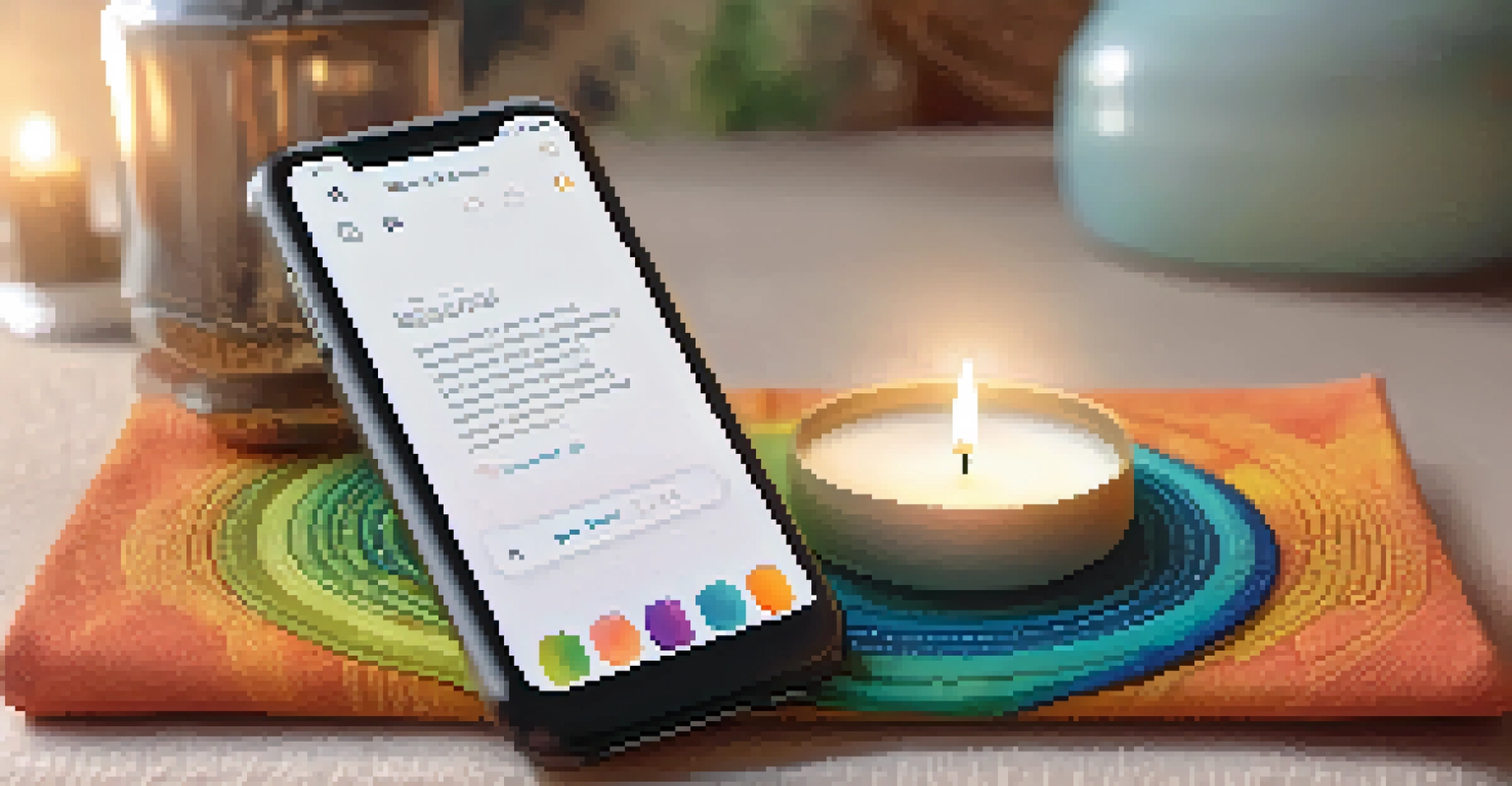Meditation Apps: Bridging Ancient Practices with Technology

The Rise of Meditation Apps in a Busy World
In our fast-paced lives, finding moments of peace can feel impossible. This is where meditation apps come into play, offering a digital sanctuary for those seeking calm. With a few taps on our smartphones, we can access guided meditations, breathing exercises, and mindfulness techniques that were once reserved for quiet retreats.
Meditation is not a way of making your mind quiet. It’s a way of entering into the quiet that’s already there—buried under the 50,000 thoughts the average person thinks every day.
These apps have gained immense popularity, particularly during stressful times, as they provide a convenient way to incorporate mindfulness into our daily routines. For many, the idea of sitting in silence for long periods can be daunting, but these apps break it down into manageable sessions. Whether it's a quick five-minute breathing exercise or a 30-minute deep dive into meditation, there's something for everyone.
Furthermore, the accessibility of meditation apps ensures that anyone, regardless of their background or experience level, can embark on a mindfulness journey. With a variety of options available, users can tailor their practice to fit their unique needs and preferences.
Ancient Practices: The Roots of Meditation
Meditation has deep roots in ancient cultures, dating back thousands of years. Originally practiced in Eastern philosophies, it served as a tool for spiritual growth and self-awareness. Today, we often think of meditation in terms of relaxation and stress relief, but its benefits extend far beyond that.

At its core, meditation is about cultivating a heightened sense of awareness and presence. Ancient practitioners understood that by quieting the mind, one could connect with a deeper sense of self and the universe. This profound understanding is what modern meditation apps strive to replicate, bringing these timeless techniques into contemporary life.
Meditation Apps Offer Accessibility
Meditation apps provide a convenient way for users of all backgrounds to incorporate mindfulness into their daily lives.
By incorporating ancient practices into their offerings, meditation apps help users tap into this rich tradition. Many apps feature teachings from renowned meditation teachers, bridging the gap between the past and present and making ancient wisdom accessible to everyone.
Features that Enhance Your Meditation Experience
Meditation apps are not just about guided sessions; they often include a range of features designed to enhance the user experience. For instance, many apps offer customizable meditation lengths, allowing users to choose how long they want to meditate based on their schedules. This flexibility makes it easier to fit mindfulness into even the busiest of days.
The mind is everything. What you think, you become.
Additionally, some apps come equipped with progress tracking, which can be a great motivator for users. By logging their sessions and seeing their progress over time, individuals can build a consistent practice. This sense of accomplishment can encourage them to continue their meditation journey and integrate it into their daily lives.
Furthermore, community features allow users to connect with others on similar paths. Whether through discussion forums, challenges, or live classes, these apps foster a sense of belonging, reminding users that they are not alone in their quest for mindfulness.
Personalization: The Key to Effective Meditation
One of the standout features of meditation apps is their ability to offer a personalized experience. Many apps use algorithms to assess user preferences and suggest tailored content accordingly. This personalization ensures that users receive meditations that resonate with them, making the practice more effective and enjoyable.
For instance, if a user indicates they struggle with anxiety, the app might recommend specific guided sessions focused on calming techniques. Conversely, someone seeking to enhance their focus might receive meditations designed to sharpen the mind. This personalized approach not only enhances the effectiveness of the sessions but also keeps users engaged.
Personalization Enhances Experience
Tailored content in meditation apps allows users to engage with practices that resonate with their specific needs and preferences.
By leveraging technology to create a unique meditation experience, these apps empower users to take control of their mindfulness journey. This tailored approach encourages individuals to explore different techniques and find what works best for them.
Incorporating Mindfulness into Daily Life
Meditation apps make it easier than ever to weave mindfulness into our daily routines. With features like reminders and short meditations, users can practice mindfulness during their commutes, lunch breaks, or even while waiting in line. This integration helps cultivate a more mindful mindset throughout the day.
For example, a user might start their morning with a quick meditation to set a positive tone, then return to the app for a breathing exercise during a stressful moment at work. These small but impactful practices contribute to improved focus and emotional resilience.
Ultimately, the goal is to encourage users to carry the lessons learned during meditation beyond the app and into their everyday lives. This holistic approach to mindfulness can lead to lasting changes in how individuals navigate their thoughts and emotions.
The Science Behind Meditation and Its Benefits
Research has shown that meditation can offer a multitude of physical and mental health benefits. Studies reveal that regular meditation practice can reduce stress, lower blood pressure, and improve overall well-being. With meditation apps making these practices more accessible, the potential for positive health outcomes is significant.
The science behind meditation lies in its ability to alter brain function. Neuroimaging studies have shown that consistent meditation can change the structure of the brain, enhancing areas related to memory, emotional regulation, and self-awareness. This means that users are not just achieving temporary relaxation; they are fostering long-term mental health benefits.
Mindfulness Can Transform Daily Life
By integrating short meditation sessions into everyday routines, users can cultivate a more mindful mindset that positively impacts their overall well-being.
By incorporating scientifically-backed techniques into their offerings, meditation apps are helping users understand the profound impact of mindfulness on their lives. This knowledge can motivate users to continue their practice, knowing that they are investing in their health and happiness.
Challenges and Considerations with Meditation Apps
While meditation apps offer numerous benefits, they are not without challenges. One common issue is the overwhelming number of options available, which can make it difficult for users to choose the right app for their needs. This abundance of choice can lead to decision fatigue, potentially discouraging newcomers from starting their meditation journey.
Moreover, some users may find it challenging to maintain consistency with their practice. Without the accountability of a physical class or group, it can be easy to skip sessions. To combat this, many apps incorporate reminders and gamification elements to encourage regular use, but ultimately, the onus is on the user to prioritize their practice.

Lastly, it's essential for users to remember that meditation is a personal journey. What works for one person may not work for another, and that's perfectly okay. Experimenting with different apps and techniques can help individuals find their unique path to mindfulness.